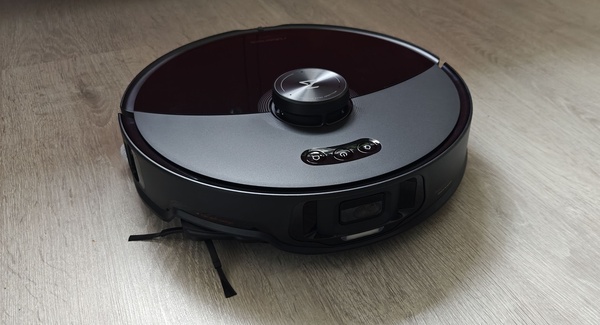
Roborock has consistently ranked among the top-selling robot vacuums globally for years. The Chinese manufacturer has distinguished itself as a leader in high-end robotic vacuums, continuously introducing innovative features year after year.
In recent years, however, competition in the innovation space has intensified, with other Chinese brands making strong pushes into the premium robot vacuum market. Despite this, Roborock has adeptly met these challenges, maintaining its position at the forefront of the industry.
This context makes it particularly intriguing to explore what Roborock currently offers to consumers who prioritize features over price. For this review, we had the opportunity to test the company's latest flagship model, the Roborock S8 MaxV Ultra, which was released in the spring of 2024. This model encapsulates Roborock's vision of the ultimate robot vacuum, incorporating the company's most advanced technologies.
The S8 MaxV Ultra is a premium robot vacuum that mops, avoids obstacles, empties its own dustbin, and even wets its mop automatically. However, its price is not for the faint of heart. As of this review's publication, the Roborock S8 MaxV Ultra is priced at an astonishing €1500 / $1800.
Given its steep price tag, this model must be compared to the most expensive offerings from other manufacturers. In this price range, there is no room for compromise when it comes to usability and cleaning performance.
As usual, we put the robot to work in our test environment for a couple of months, using it as the sole floor-cleaning tool in the home, and closely monitored how this new model performed.
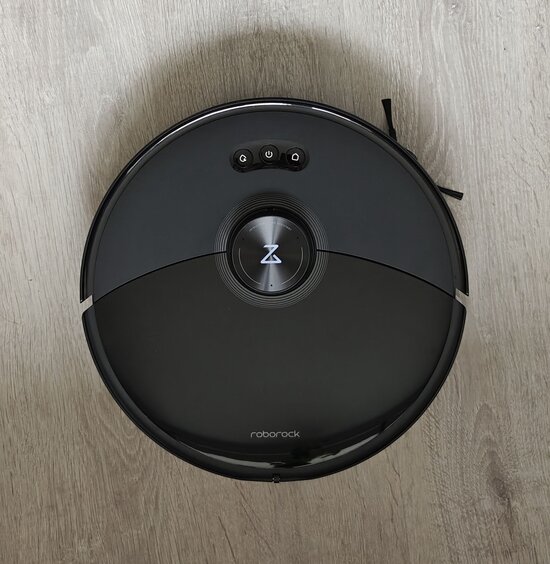
From the top, the Roborock S8 MaxV Ultra resembles any other robot vacuum. At the center of the device is a prominent bump housing the robot's LiDAR sensor, which enables it to navigate through your home.
You'll also find three physical buttons on top, allowing you to control the basic functions manually when needed.
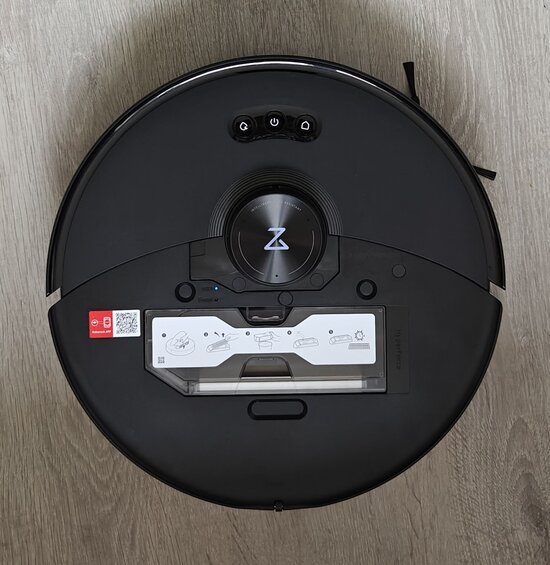
There's also a magnetically attached cover on top that reveals a small internal dustbin underneath. However, in the model we tested, accessing this dustbin is rarely necessary, as the robot automatically empties it into the docking station.
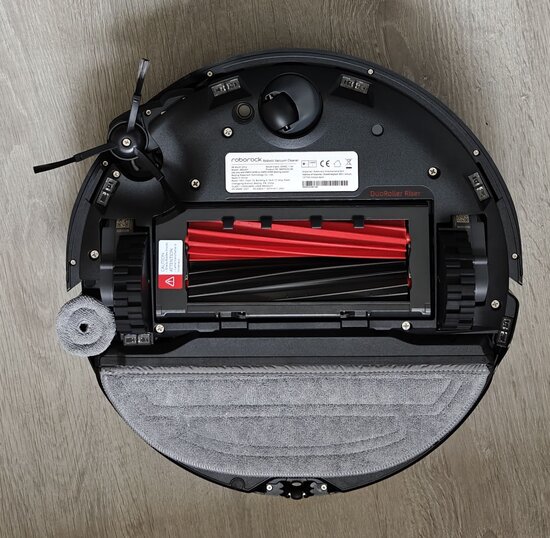
The underside of the Roborock is where things get more interesting.
First, there's a traditional mopping plate covering one entire side of the robot. The mopping plate can be removed if necessary, but in practice, it's best left attached. The Roborock can automatically lift the mop plate when it encounters carpets.
The presence of two silicone cleaning rollers is a welcome feature. In our tests over the years, vacuums with a single roller tend to perform worse in cleaning compared to models that use two rollers.
The side brush is pleasantly long, reaching into corners effectively--an area where brush length is crucial.
However, the most intriguing feature on the underside of the Roborock is a small round cleaning pad. This pad acts as a mopping counterpart to the side brush, enabling the Roborock to mop corners and other hard-to-reach spots.
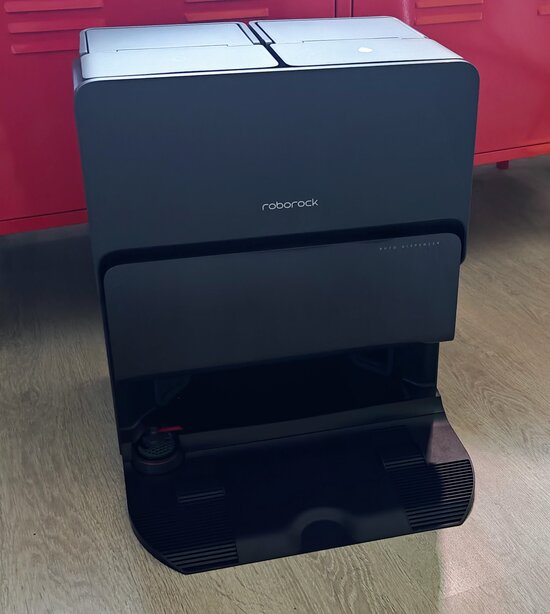
The Roborock docking station is imposing and black, combining both glossy and matte plastic materials. The glossy sections, however, tend to attract visible dust during our tests, which is why I would have preferred an all-matte finish -- even if it doesn't look as sleek in photos.
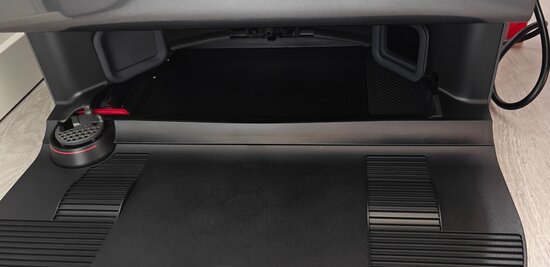
Despite this, the dock exudes a high-quality feel. While not as tall or massive as some competitors' docks, it is still quite large. According to the manufacturer, the dock's dimensions are approximately 41 x 42 x 47 cm, meaning it won't fit under a bed or similar spaces.
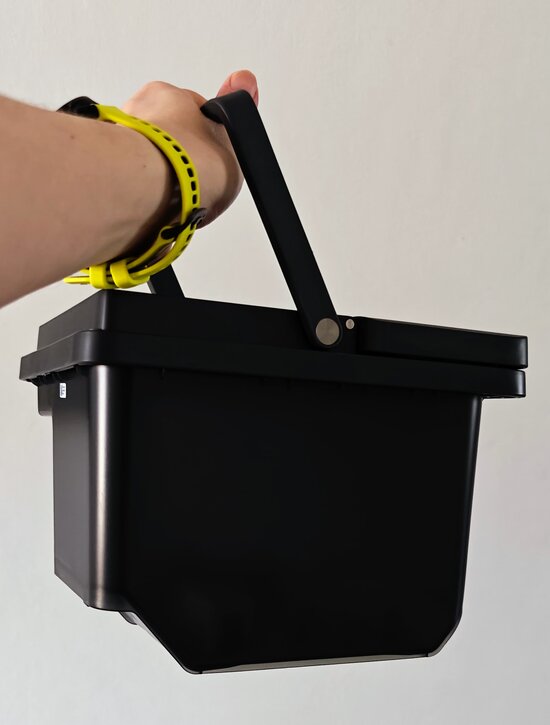
The most space-consuming elements in the dock are the water tanks, a key innovation in the Roborock S8 MaxV Ultra. Beneath the dock's lid, you'll find two tanks: a 3.5-liter clean water tank and a 2.9-liter dirty water tank.
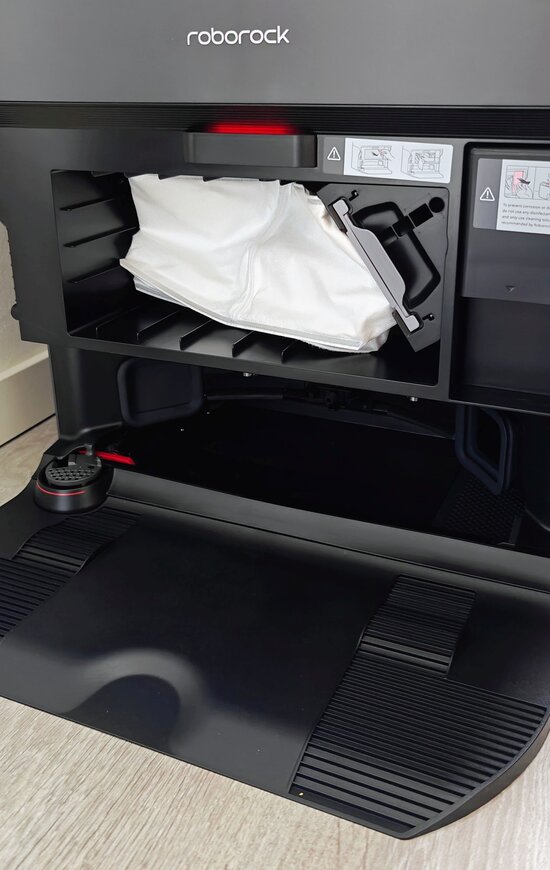
Additionally, there's a compartment at the center of the dock that houses a dust bag. The dock automatically empties the robot's internal dustbin into this bag when it becomes full.
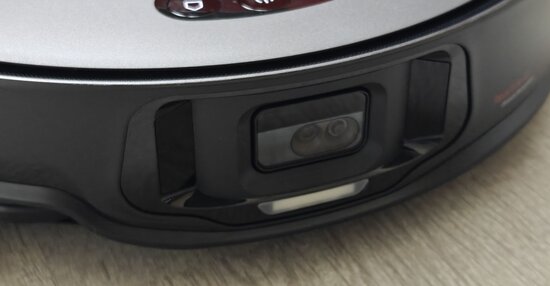
On the front of the robot, you'll find one more crucial feature: a camera paired with an auxiliary light. The Roborock uses this front-facing camera to detect obstacles left on the floor. The light assists the camera in low-light environments, automatically turning on when needed.
Potential buyers should pay close attention when choosing a Roborock model, as the company's naming conventions are extremely confusing, albeit logical.
In the case of the Roborock S8 MaxV Ultra, "S8" indicates the "level" of the robot, meaning that all other S8 models are roughly equivalent in basic functionality.
However, "MaxV" indicates that this model is equipped with obstacle avoidance, meaning it can navigate around objects left on the floor. Models without this designation lack the cameras needed for obstacle detection.
Additionally, the "Ultra" in the name signifies that this model can automatically empty its internal dustbin into a larger dust bag located in the dock.
Thus, this review pertains specifically to the Roborock S8 MaxV Ultra model, and the conclusions drawn here may not directly apply to other models, such as the slightly more affordable Roborock S8 Pro Ultra.
The Roborock S8 MaxV Ultra is undoubtedly a robot vacuum that requires a companion smartphone and a Wi-Fi network in your home. Without the smartphone app or a willingness to learn how to use it, I would consider it pointless to purchase a Roborock, as most of its features would go unused. Frankly, I'm not even sure if the Roborock S8 MaxV can operate at all without being connected to the internet.
Now, a few words about the app... In its early days, Roborock was part of the broader "Xiaomi family" in China, where new tech companies closely collaborated with the tech giant Xiaomi. This resulted in Roborock's smartphone apps being, for many years, nearly identical copies of Xiaomi's, with only minor tweaks.
However, Roborock has since seemingly fully detached from its old connection with Xiaomi, and the development of the smartphone app has taken a step towards a clearer, more distinct design.
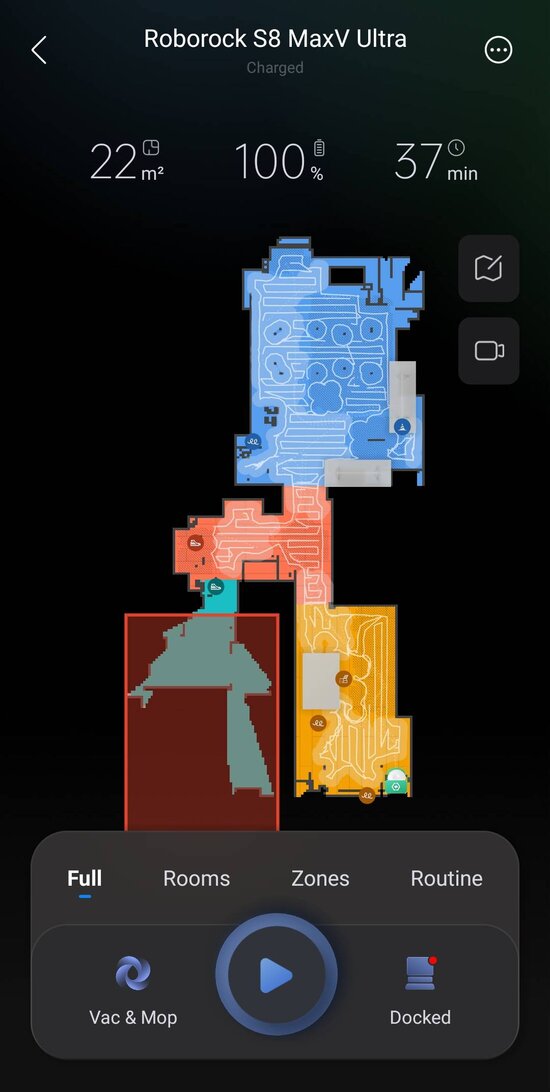
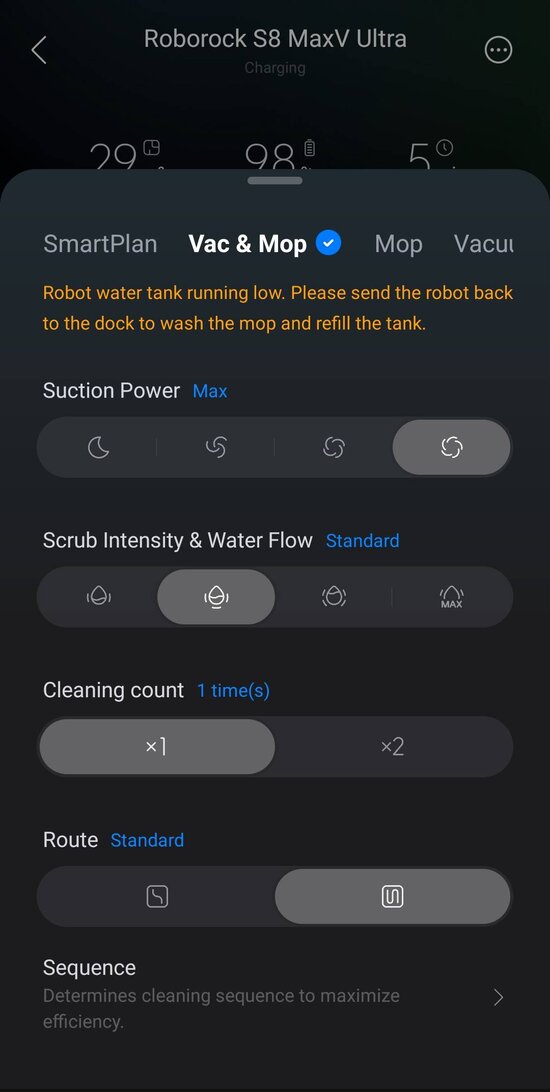
The app still retains a slightly technical feel, to the extent that old Nokia engineers might feel right at home navigating its menus.
Nevertheless, most features are now clearly organized and easy to find in logical places. One bonus feature worth mentioning is that the Android version of the Roborock app supports dark mode--making it the first robot vacuum app I've encountered with this feature.
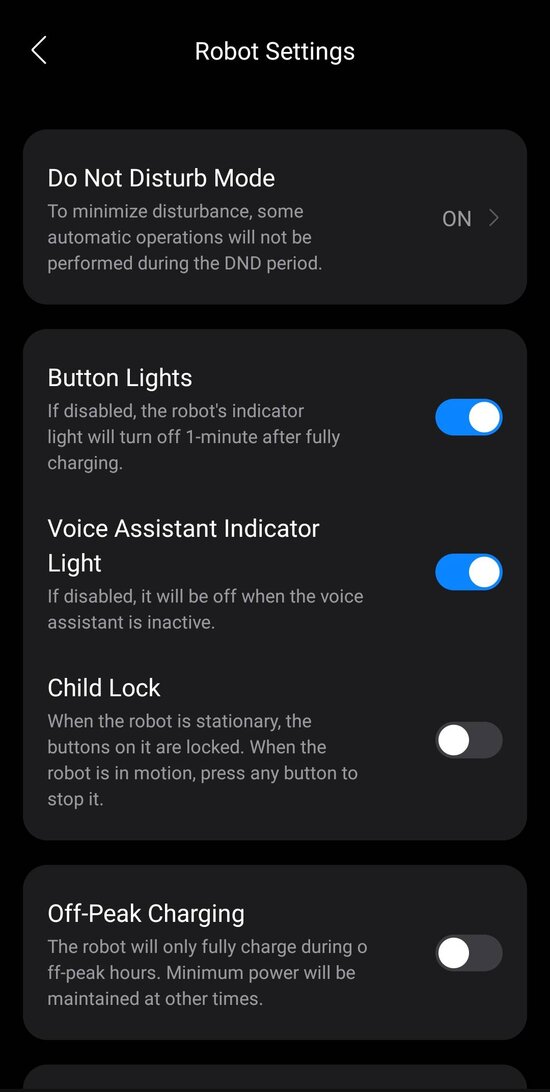
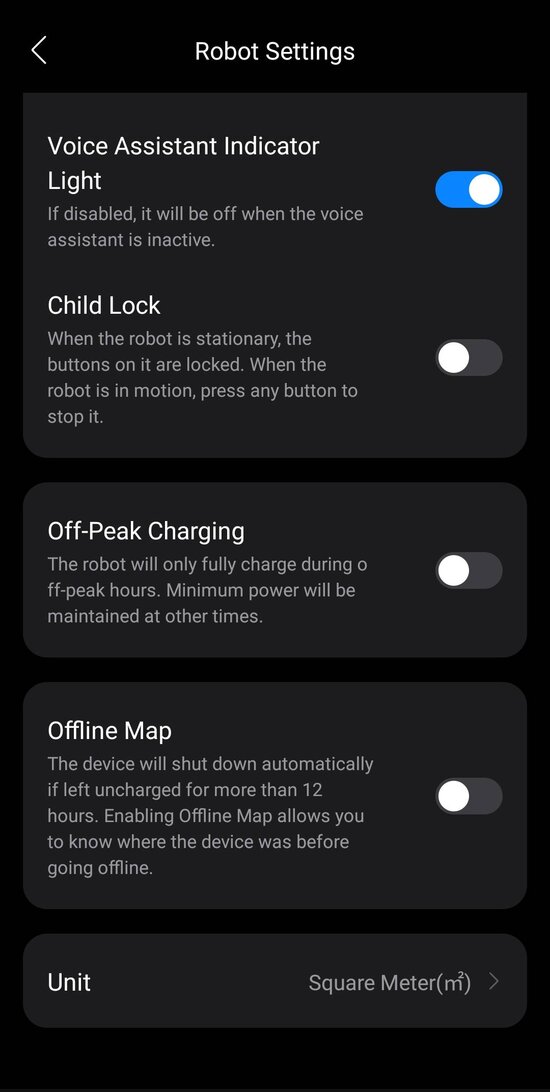
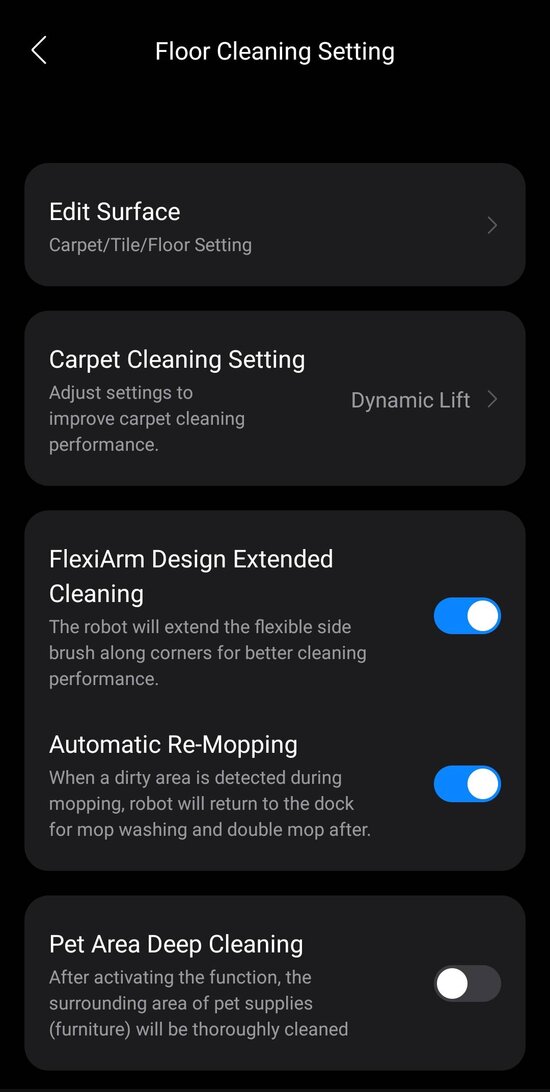
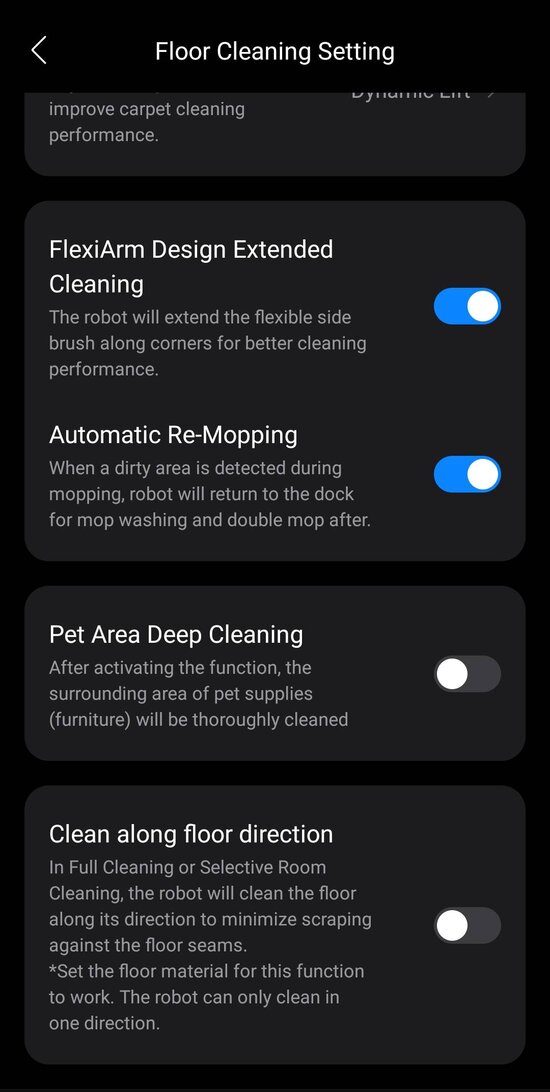
Through the app, you can freely adjust the robot's functions. For cleaning, you can set the vacuum's suction power, mop moisture levels, the number of cleaning passes per session, and even the robot's movement patterns.
The app also allows you to create quick actions, such as "vacuum the kitchen twice after meals" or "mop the entryway after walking the dog in the evening," which you can easily activate as needed.
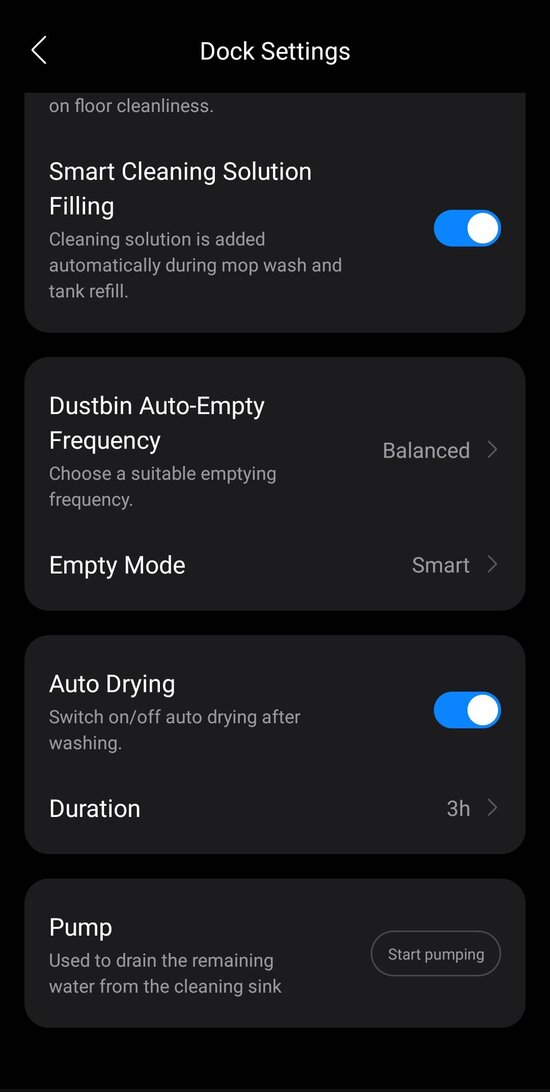
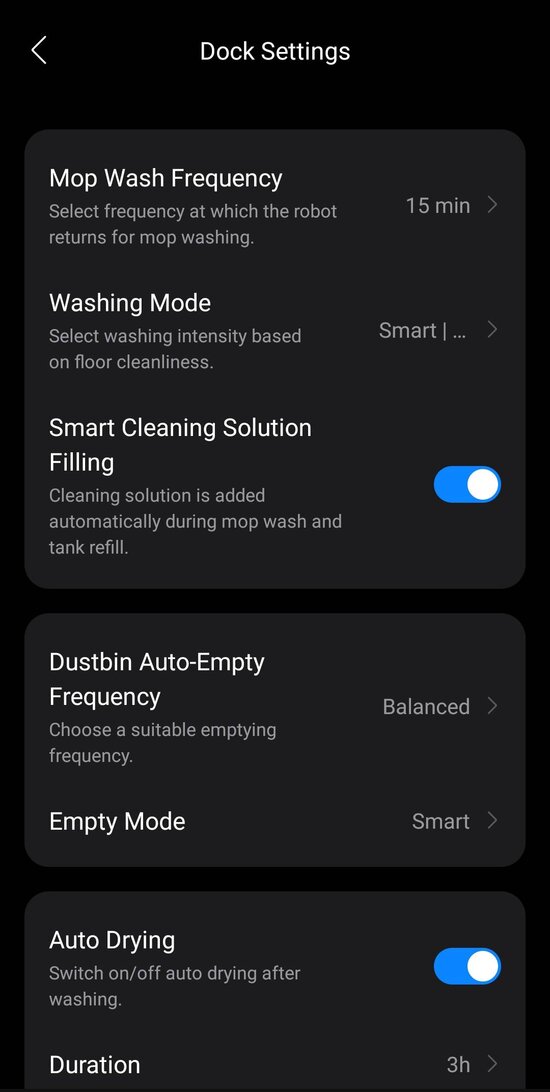
Overall, the app is incredibly versatile, and its only significant downside is that the app is translated to only a handful of languages - lacking, for example, AfterDawn's primary language (Finnish).
One of the most essential tools in the Roborock smartphone app, particularly during the initial setup of the robot, is the map editor. When using the robot for the first time, it is crucial to allow it to map the entire living space. During this initial mapping process, all interior doors should be opened, and any obstacles or clutter should be removed from the floor. After the mapping is complete, you won't need to remove items from the floor anymore, but during the process, it's important to ensure that the robot can access and "see" everything.
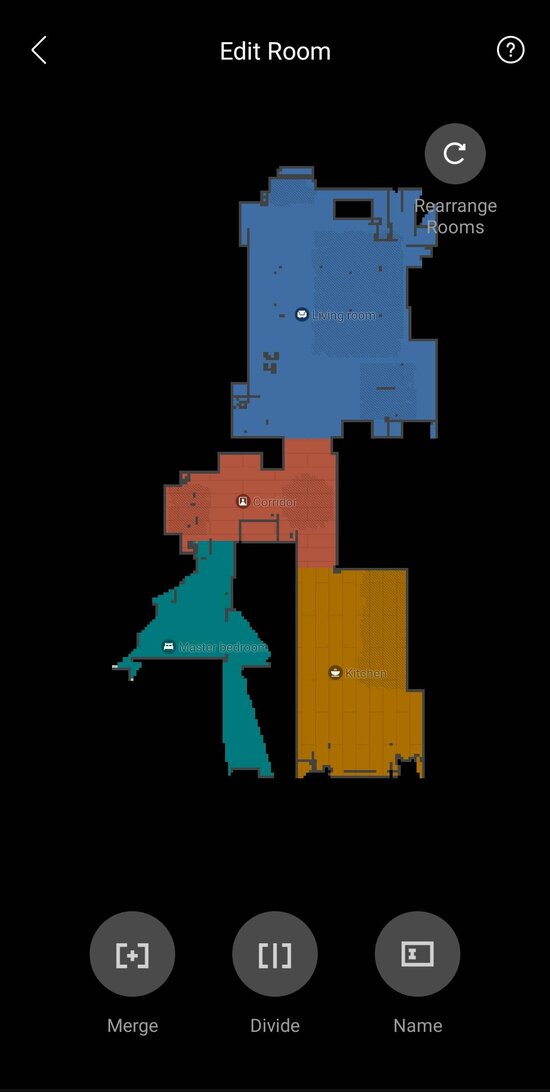
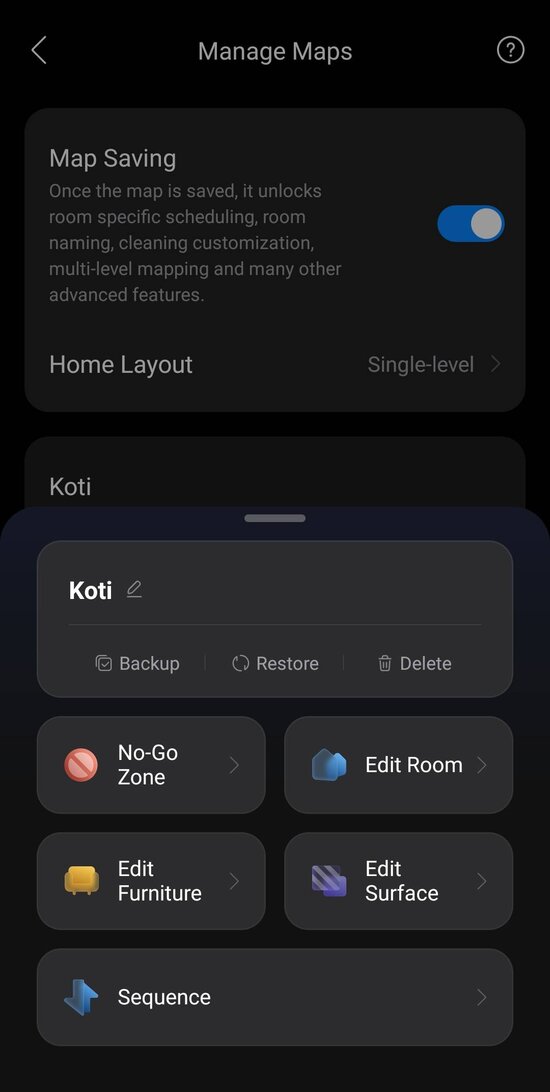
Once the map is created, it is advisable to start editing it. The app allows you to divide the home layout into separate rooms and areas. You can also designate zones where the robot should never enter.
Additionally, you can set specific areas to be vacuumed only, avoiding mopping altogether. Although the robot can identify rugs on its own, manually marking them on the map isn't a bad idea if you want to ensure the wet mop doesn't touch them.
Overall, map editing and management are well-designed and intuitive in the Roborock app.
The mopping function of the Roborock S8 MaxV Ultra presents a bit of a mixed bag. It combines both outdated and inefficient features with new and proven innovations.
On the outdated and less effective side, the Roborock uses a mopping plate attached to the robot for mopping. In practice, this means that the Roborock drags the mopping plate behind it. This method is less effective compared to competitors like Ecovacs and Dreame, which use spinning mops that scrub the floor.
On the modern side, Roborock can wet the mop itself using clean water from a tank located in the dock. As the cleaning progresses, the Roborock periodically returns to its docking station, where it squeezes out the dirty water from the mop and refreshes it with clean water--then resumes cleaning from where it left off.
An interesting innovation is the small, palm-sized mop pad that reaches into corners and edges. While I'm not sure how much practical benefit this small extension offers, the wall edges did appear quite clean after the cleaning process.
Unfortunately, even with a constantly moistened mopping plate, the Roborock doesn't clean tough, stuck-on dirt effectively. It does an excellent job of removing fine dust from the floors, but it's not effective for stain removal.
Vacuuming is generally top-notch in all robot vacuums within this price range, and the Roborock S8 MaxV Ultra is no exception.
In practice, its powerful suction, which can automatically increase when it detects dirt, consistently removed easily detachable dirt from the floors. The only exception was thicker rugs, where dust was not always fully removed in a single pass.
However, it's hard to criticize this, as a robot vacuum shouldn't be viewed like a traditional vacuum cleaner. Instead of vacuuming infrequently, you should let the robot vacuum work often, ideally daily. This way, the cleaning tasks build upon each other, and even the most stubborn dirt is continuously kept off the floors.
Roborock seemed to do particularly well in corners and along walls, where its strong suction power likely combined with the previously mentioned small, extending side pad. Thanks to this combination, even the farthest corners of the kitchen stayed relatively free of breadcrumbs during our testing period.
When it comes to vacuuming, the Roborock was a highly effective helper.
And as previously mentioned, the dustbin is automatically emptied into the dust bag in the dock after each cleaning session.
In recent years, the situation with the most expensive robot vacuums has gradually reached the point where a certain level of "ease of life" has become the most important criterion in my reviews.
In other words, when it comes to robot vacuums that cost over a thousand euros, there are rarely significant differences in the cleaning results--they are all generally excellent in that regard. But the differences arise in how well the robots navigate a home that hasn't been made "robot-friendly."
A few years ago, robot vacuum owners had to accept the fact that fringed rugs and children's toys needed to be taken to the backyard and burned in a bonfire once a robot vacuum was brought into the home.
Today, when testing top-level, obstacle-avoiding vacuums, I deliberately leave the apartment exactly as it is when I turn the vacuum on. I don't pick up anything from the floor, I don't move furniture, and I certainly don't roll up rugs.
The goal is to observe whether any vacuum can reach the point where it can navigate an ordinary, lived-in home--where no time or effort is spent on preparing the space for the robot's visit.
Using this method, the Roborock S8 MaxV Ultra was both a pleasant surprise and a disappointment.
First, the good news... Roborock is one of the few vacuums I've tested, if not the only one so far, that didn't get stuck on any rug or chair leg even once. Chrome-plated, floor-level Ikea kitchen chairs have been a nightmare for almost all robot vacuums I've tested. The same problem has occurred with laundry drying racks. Another major issue is light rugs, which most robot vacuums bunch up and then get stuck in the resulting pile.
Roborock had hardly any issues with kitchen chairs or rugs. Even when the robot seemed to get stuck on the kitchen chairs, it somehow managed to extricate itself from the situation. A stellar performance.
However, when it comes to obstacles in the home, Roborock should, on paper, excel. The Roborock app offers a vast array of settings to ensure that all obstacles left on the floor are detected--and avoided.
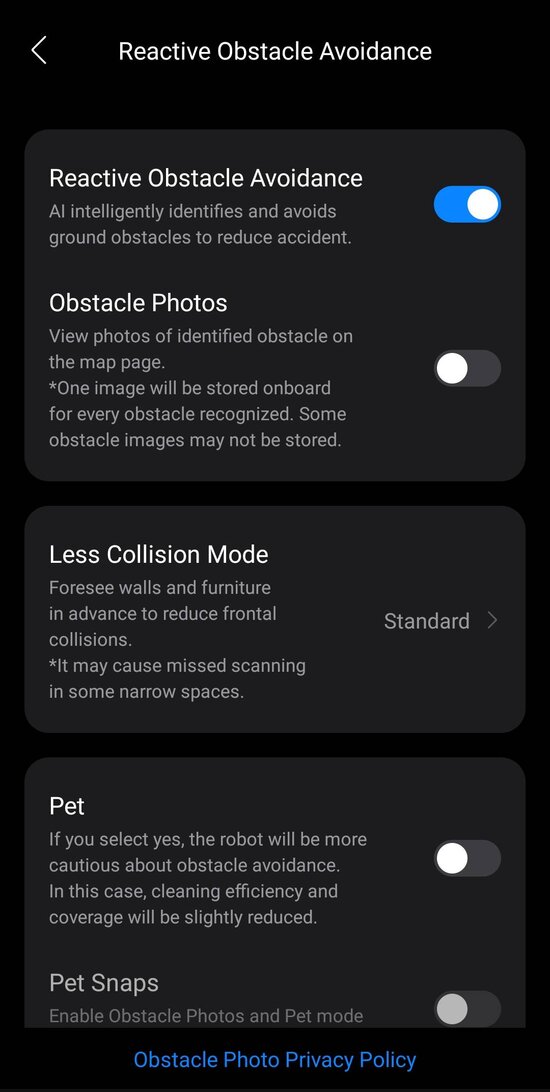
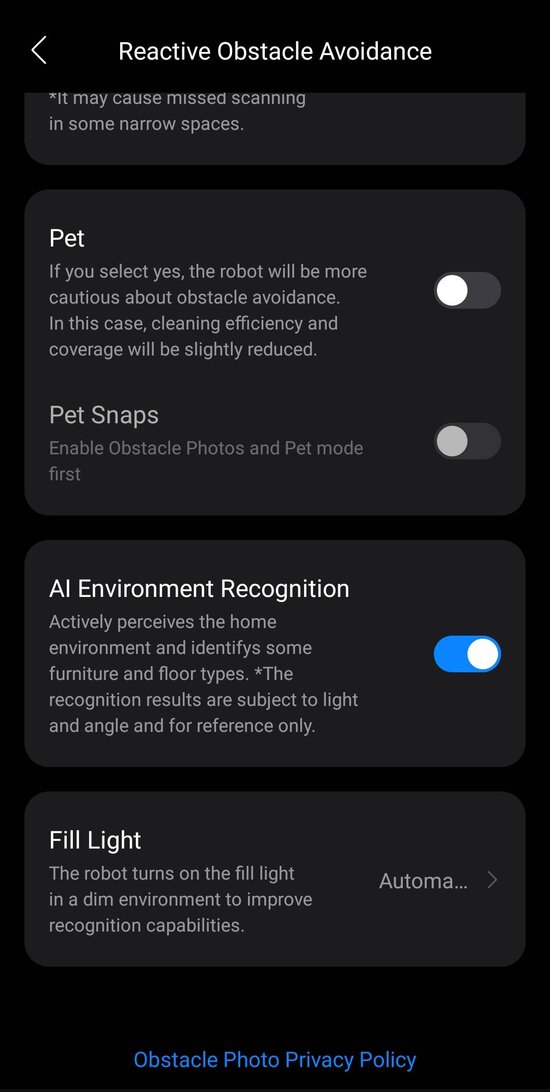
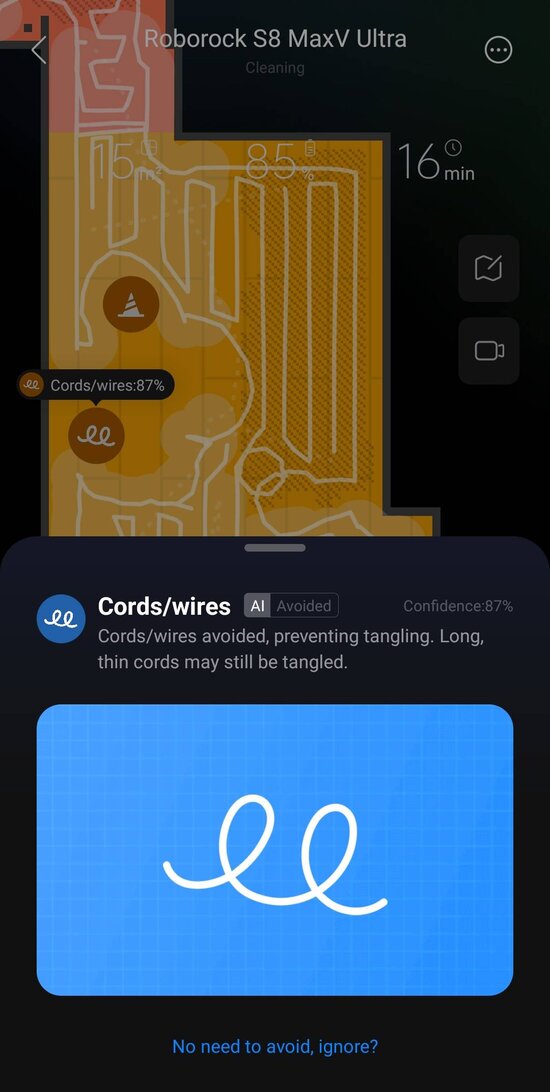
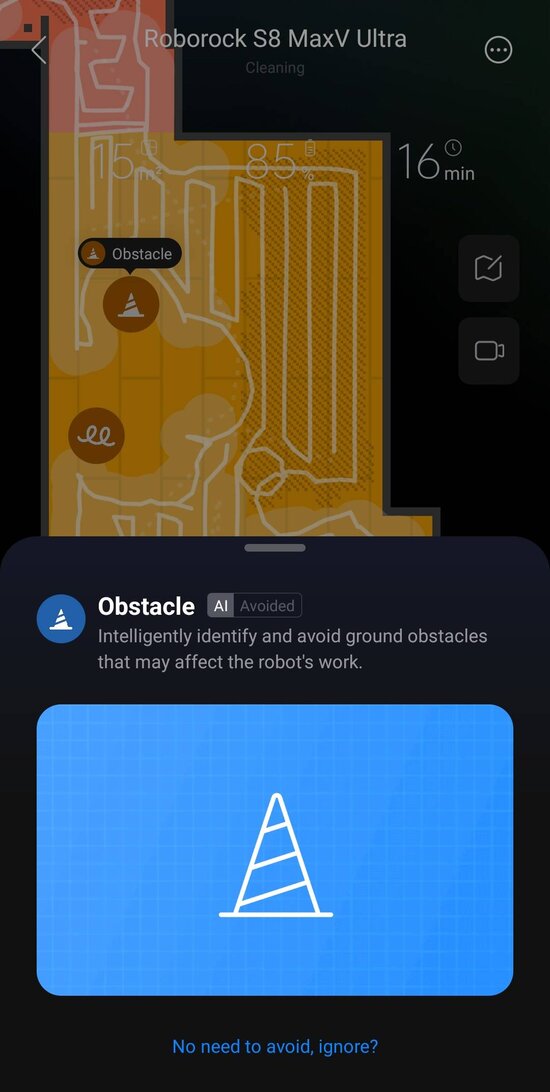
But then there's the disappointment. For several years now, we've been testing obstacle-avoiding robot vacuums from various brands, using cameras and lidar. These vacuums have generally performed very well in their tasks. That is, obstacle-avoiding robots have used their cameras to detect cords, toys, and clothes left on the floor--and avoid those areas.
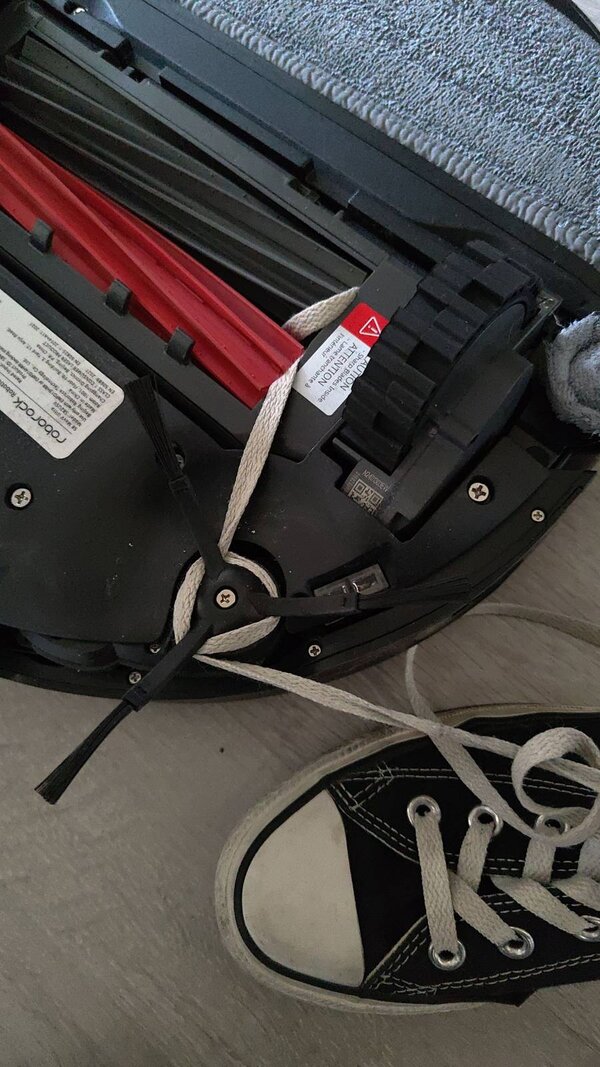
Unfortunately, there seems to be something fundamentally wrong with Roborock's obstacle detection. Despite having a camera and an additional light for dark areas, its obstacle detection did not work as well as it should have.
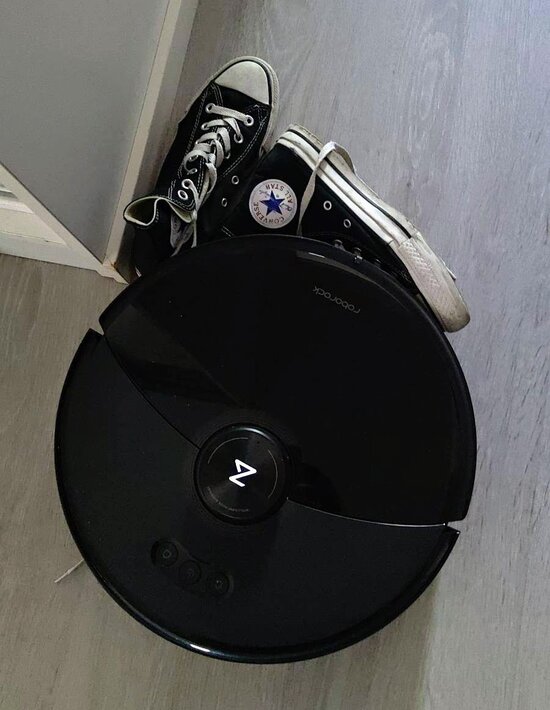
Shoes left in the hallway were particularly irresistible to the Roborock, and I had to rescue half-eaten shoelaces from the robot's mouth almost every time I forgot to remove the shoes from the hallway.
The same issue occurred with phone charger cables. Although this didn't happen as frequently as with shoelaces, it was still too often--especially considering that competing models don't make similar mistakes.
The problem shouldn't even be with contrast, as the Roborock regularly consumed shoes with both dark and white laces, in the same hallway.
Additionally, the robot managed to nudge something left on the floor, such as a backpack, just enough to block its own path. This way, the robot could end up stuck in a trap of its own making, unable to navigate around the obstacle on the floor.
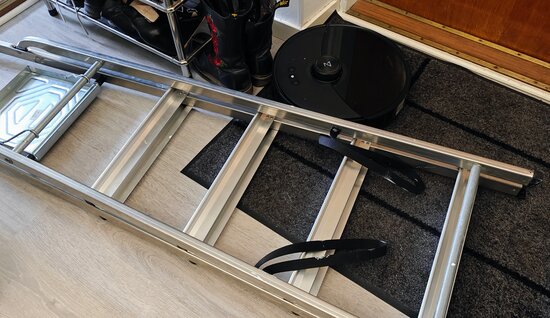
In the picture: a ladder knocked over by the robot, trapping it behind
Perhaps the most alarming obstacle avoidance issue occurred when the robot knocked over a ladder that had been leaning against a wall. Luckily, the ladder fell onto the floor without breaking anything. However, the Roborock managed to trap itself between the ladder and other furniture, unable to free itself.
The Roborock S8 MaxV Ultra rarely requires any attention from its owner. The self-emptying dustbin ensures that you never have to empty the vacuum. After a two-month test period, the dust bag in the dock wasn't even half full, so it only needs to be replaced a couple of times a year, depending on the level of dirt on your household floors.
Mopping, on the other hand, consumes water, but the generously sized water tanks provide sufficient breathing room. The refill interval for the tanks seems to be about every 200-300 m² of cleaning, if the water consumption for mopping is set to medium in the app.
When going on a longer vacation, I would set the Roborock to only vacuum and perhaps mop once before returning home. This way, there's no issue with refilling the mop tanks while the robot operates autonomously.
Otherwise, maintenance requires hardly any actions. Every two to three months, I recommend cleaning the robot's cleaning rollers, wheels, and the dock area where the robot cleans its mop pads. Of course, the interval also directly depends on whether there are pets or kids playing in the sand at home.
The Roborock S8 MaxV Ultra is very, very close to being the perfect robot vacuum.
In robot vacuums costing over a thousand euros, there aren't many differences anymore in how well they can clean an apartment, as practically all models in this price range are extremely good at vacuuming itself.
In this price range, the most important evaluation criterion becomes the ease of maintenance. By ease of maintenance, we mean how much or how little attention the robot requires from its owner in daily life. That is, whether the apartment needs to be modified somehow to be "robot-friendly," whether rugs or toys need to be picked up from the floor before vacuuming, and whether some furniture might need to be excluded from the cleaning areas.
And it is precisely in the ease of daily use that Roborock is one of the best, if not the best, of all the robot vacuums we've tested. It didn't get stuck on rugs. It was, to my recollection, the first robot vacuum I've ever tested that didn't get confused by Ikea's shiny chair legs. The robot was simply very reliable, day after day.
But because the price category of the robot (around €1500 / $1800 at the time of review) is so extraordinarily high, we must also be stricter about the issues and shortcomings we've noticed.
First of all, Roborock's mopping technique is significantly weaker than that of many other manufacturers: Ecovacs and Dreame offer rotating, scrubbing mop pads that are much more effective for tough dirt than the mop cloth that Roborock drags behind.
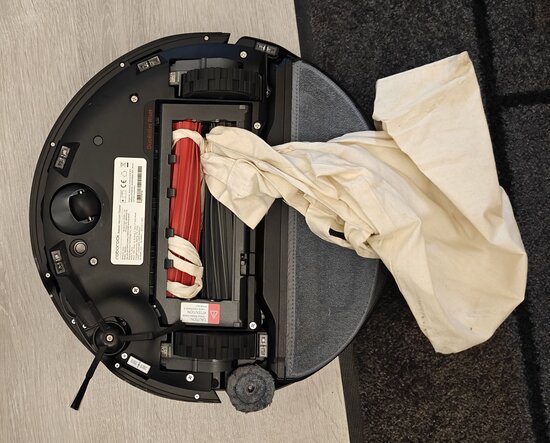
a shopping bag that Roborock decided to "eat"
And the other issue concerns obstacle avoidance. Although Roborock performed better with furniture and rugs than any other model we've tested before, its ability to avoid small obstacles was not on par with the best competitors. Roborock managed to "eat" shoelaces far too many times during our test period, and one phone charger cable had to be dug out from deep inside the robot's jaws after cleaning.
The obstacle avoidance problems are quite peculiar because the camera equipped with an auxiliary light is used in many other obstacle-avoiding robot vacuums, and models from other manufacturers do recognize obstacles like shoelaces.
So, unfortunately, Roborock hasn't yet created a perfect robot vacuum--and with this price tag, it's hard to forgive even the smallest flaws or issues. However, despite its small problems, the Roborock S8 MaxV Ultra is an incredibly good robot vacuum.
If budget is not a concern when you're looking for a robot vacuum, but the Roborock S8 MaxV Ultra doesn't quite convince you, there are fortunately other options in this super-expensive robot vacuum category.
Perhaps the most important competitor to Roborock in terms of features is the Ecovacs Deebot X2, which we have also reviewed. It is very similar to Roborock in terms of features but offers rotating mop pads and slightly larger water tanks. Unfortunately, its obstacle avoidance didn't fully convince us in our test either.
If you're looking for better obstacle avoidance, we believe the Roomba Combo j7+ is the right solution. It also drags a mop cloth behind it, but in our review, its obstacle avoidance was clearly better than Roborock's.
If you're interested in Roborock's features but the budget doesn't quite stretch to this level, a slightly cheaper option would be the Dreame L10 Ultra. It lacks obstacle avoidance altogether but offers rotating mop pads like Ecovacs and the same-sized water tanks as Roborock.
In itself, Roborock is very close to the perfect robot vacuum. But because the competition in this extraordinarily expensive vacuum category is so tight, our criteria for perfect scores are also very strict.
Unfortunately, the poorly functioning obstacle avoidance is a significant enough drawback to lower the robot's overall rating without mercy. Additionally, compared to competitors, the outdated technology used for mopping is also a minus when you consider what other models you can buy for nearly 1500 euros.
This context makes it particularly intriguing to explore what Roborock currently offers to consumers who prioritize features over price. For this review, we had the opportunity to test the company's latest flagship model, the Roborock S8 MaxV Ultra, which was released in the spring of 2024. This model encapsulates Roborock's vision of the ultimate robot vacuum, incorporating the company's most advanced technologies.
The S8 MaxV Ultra is a premium robot vacuum that mops, avoids obstacles, empties its own dustbin, and even wets its mop automatically. However, its price is not for the faint of heart. As of this review's publication, the Roborock S8 MaxV Ultra is priced at an astonishing €1500 / $1800.
Given its steep price tag, this model must be compared to the most expensive offerings from other manufacturers. In this price range, there is no room for compromise when it comes to usability and cleaning performance.
As usual, we put the robot to work in our test environment for a couple of months, using it as the sole floor-cleaning tool in the home, and closely monitored how this new model performed.
- Design and features
- Tech specs
- Weird naming conventions
- Smartphone app
- Map editing
- Mopping
- Vacuuming
- Obstacles
- Maintenance
- Summary
- Pros
- Cons
- Alternatives
- Stars
Roborock's Design and Features

From the top, the Roborock S8 MaxV Ultra resembles any other robot vacuum. At the center of the device is a prominent bump housing the robot's LiDAR sensor, which enables it to navigate through your home.
You'll also find three physical buttons on top, allowing you to control the basic functions manually when needed.

There's also a magnetically attached cover on top that reveals a small internal dustbin underneath. However, in the model we tested, accessing this dustbin is rarely necessary, as the robot automatically empties it into the docking station.

The underside of the Roborock is where things get more interesting.
First, there's a traditional mopping plate covering one entire side of the robot. The mopping plate can be removed if necessary, but in practice, it's best left attached. The Roborock can automatically lift the mop plate when it encounters carpets.
The presence of two silicone cleaning rollers is a welcome feature. In our tests over the years, vacuums with a single roller tend to perform worse in cleaning compared to models that use two rollers.
The side brush is pleasantly long, reaching into corners effectively--an area where brush length is crucial.
However, the most intriguing feature on the underside of the Roborock is a small round cleaning pad. This pad acts as a mopping counterpart to the side brush, enabling the Roborock to mop corners and other hard-to-reach spots.

The Roborock docking station is imposing and black, combining both glossy and matte plastic materials. The glossy sections, however, tend to attract visible dust during our tests, which is why I would have preferred an all-matte finish -- even if it doesn't look as sleek in photos.

Despite this, the dock exudes a high-quality feel. While not as tall or massive as some competitors' docks, it is still quite large. According to the manufacturer, the dock's dimensions are approximately 41 x 42 x 47 cm, meaning it won't fit under a bed or similar spaces.

The most space-consuming elements in the dock are the water tanks, a key innovation in the Roborock S8 MaxV Ultra. Beneath the dock's lid, you'll find two tanks: a 3.5-liter clean water tank and a 2.9-liter dirty water tank.

Additionally, there's a compartment at the center of the dock that houses a dust bag. The dock automatically empties the robot's internal dustbin into this bag when it becomes full.

On the front of the robot, you'll find one more crucial feature: a camera paired with an auxiliary light. The Roborock uses this front-facing camera to detect obstacles left on the floor. The light assists the camera in low-light environments, automatically turning on when needed.
Roborock S8 MaxV Ultra, Technical Specifications
| Dock Size | 41 x 47 x 42 cm (width x height x depth) |
| Battery Life | 180 minutes (manufacturer's claim) 5200 mAh battery |
| Water Tanks | 3.5-liter clean water tank; 2.9-liter dirty water tank |
| Robot Height | 10.3 cm |
| Additional Features | Self-emptying dustbin; Fetches additional water for mopping from the dock; Can resume cleaning from where it left off; Automatically lifts mop when on carpet |
| Price | Approximately €1500 / $1800 (07/2024) |
Roborock's Naming Conventions
Potential buyers should pay close attention when choosing a Roborock model, as the company's naming conventions are extremely confusing, albeit logical.
In the case of the Roborock S8 MaxV Ultra, "S8" indicates the "level" of the robot, meaning that all other S8 models are roughly equivalent in basic functionality.
However, "MaxV" indicates that this model is equipped with obstacle avoidance, meaning it can navigate around objects left on the floor. Models without this designation lack the cameras needed for obstacle detection.
Additionally, the "Ultra" in the name signifies that this model can automatically empty its internal dustbin into a larger dust bag located in the dock.
Thus, this review pertains specifically to the Roborock S8 MaxV Ultra model, and the conclusions drawn here may not directly apply to other models, such as the slightly more affordable Roborock S8 Pro Ultra.
Smartphone App
The Roborock S8 MaxV Ultra is undoubtedly a robot vacuum that requires a companion smartphone and a Wi-Fi network in your home. Without the smartphone app or a willingness to learn how to use it, I would consider it pointless to purchase a Roborock, as most of its features would go unused. Frankly, I'm not even sure if the Roborock S8 MaxV can operate at all without being connected to the internet.
Now, a few words about the app... In its early days, Roborock was part of the broader "Xiaomi family" in China, where new tech companies closely collaborated with the tech giant Xiaomi. This resulted in Roborock's smartphone apps being, for many years, nearly identical copies of Xiaomi's, with only minor tweaks.
However, Roborock has since seemingly fully detached from its old connection with Xiaomi, and the development of the smartphone app has taken a step towards a clearer, more distinct design.


The app still retains a slightly technical feel, to the extent that old Nokia engineers might feel right at home navigating its menus.
Nevertheless, most features are now clearly organized and easy to find in logical places. One bonus feature worth mentioning is that the Android version of the Roborock app supports dark mode--making it the first robot vacuum app I've encountered with this feature.




Through the app, you can freely adjust the robot's functions. For cleaning, you can set the vacuum's suction power, mop moisture levels, the number of cleaning passes per session, and even the robot's movement patterns.
The app also allows you to create quick actions, such as "vacuum the kitchen twice after meals" or "mop the entryway after walking the dog in the evening," which you can easily activate as needed.


Overall, the app is incredibly versatile, and its only significant downside is that the app is translated to only a handful of languages - lacking, for example, AfterDawn's primary language (Finnish).
Map Editing
One of the most essential tools in the Roborock smartphone app, particularly during the initial setup of the robot, is the map editor. When using the robot for the first time, it is crucial to allow it to map the entire living space. During this initial mapping process, all interior doors should be opened, and any obstacles or clutter should be removed from the floor. After the mapping is complete, you won't need to remove items from the floor anymore, but during the process, it's important to ensure that the robot can access and "see" everything.


Once the map is created, it is advisable to start editing it. The app allows you to divide the home layout into separate rooms and areas. You can also designate zones where the robot should never enter.
Additionally, you can set specific areas to be vacuumed only, avoiding mopping altogether. Although the robot can identify rugs on its own, manually marking them on the map isn't a bad idea if you want to ensure the wet mop doesn't touch them.
Overall, map editing and management are well-designed and intuitive in the Roborock app.
Mopping
The mopping function of the Roborock S8 MaxV Ultra presents a bit of a mixed bag. It combines both outdated and inefficient features with new and proven innovations.
On the outdated and less effective side, the Roborock uses a mopping plate attached to the robot for mopping. In practice, this means that the Roborock drags the mopping plate behind it. This method is less effective compared to competitors like Ecovacs and Dreame, which use spinning mops that scrub the floor.
On the modern side, Roborock can wet the mop itself using clean water from a tank located in the dock. As the cleaning progresses, the Roborock periodically returns to its docking station, where it squeezes out the dirty water from the mop and refreshes it with clean water--then resumes cleaning from where it left off.
An interesting innovation is the small, palm-sized mop pad that reaches into corners and edges. While I'm not sure how much practical benefit this small extension offers, the wall edges did appear quite clean after the cleaning process.
Unfortunately, even with a constantly moistened mopping plate, the Roborock doesn't clean tough, stuck-on dirt effectively. It does an excellent job of removing fine dust from the floors, but it's not effective for stain removal.
Vacuuming
Vacuuming is generally top-notch in all robot vacuums within this price range, and the Roborock S8 MaxV Ultra is no exception.
In practice, its powerful suction, which can automatically increase when it detects dirt, consistently removed easily detachable dirt from the floors. The only exception was thicker rugs, where dust was not always fully removed in a single pass.
However, it's hard to criticize this, as a robot vacuum shouldn't be viewed like a traditional vacuum cleaner. Instead of vacuuming infrequently, you should let the robot vacuum work often, ideally daily. This way, the cleaning tasks build upon each other, and even the most stubborn dirt is continuously kept off the floors.
Roborock seemed to do particularly well in corners and along walls, where its strong suction power likely combined with the previously mentioned small, extending side pad. Thanks to this combination, even the farthest corners of the kitchen stayed relatively free of breadcrumbs during our testing period.
When it comes to vacuuming, the Roborock was a highly effective helper.
And as previously mentioned, the dustbin is automatically emptied into the dust bag in the dock after each cleaning session.
Obstacles, Rugs, and Furniture
In recent years, the situation with the most expensive robot vacuums has gradually reached the point where a certain level of "ease of life" has become the most important criterion in my reviews.
In other words, when it comes to robot vacuums that cost over a thousand euros, there are rarely significant differences in the cleaning results--they are all generally excellent in that regard. But the differences arise in how well the robots navigate a home that hasn't been made "robot-friendly."
A few years ago, robot vacuum owners had to accept the fact that fringed rugs and children's toys needed to be taken to the backyard and burned in a bonfire once a robot vacuum was brought into the home.
Today, when testing top-level, obstacle-avoiding vacuums, I deliberately leave the apartment exactly as it is when I turn the vacuum on. I don't pick up anything from the floor, I don't move furniture, and I certainly don't roll up rugs.
The goal is to observe whether any vacuum can reach the point where it can navigate an ordinary, lived-in home--where no time or effort is spent on preparing the space for the robot's visit.
Using this method, the Roborock S8 MaxV Ultra was both a pleasant surprise and a disappointment.
First, the good news... Roborock is one of the few vacuums I've tested, if not the only one so far, that didn't get stuck on any rug or chair leg even once. Chrome-plated, floor-level Ikea kitchen chairs have been a nightmare for almost all robot vacuums I've tested. The same problem has occurred with laundry drying racks. Another major issue is light rugs, which most robot vacuums bunch up and then get stuck in the resulting pile.
Roborock had hardly any issues with kitchen chairs or rugs. Even when the robot seemed to get stuck on the kitchen chairs, it somehow managed to extricate itself from the situation. A stellar performance.
However, when it comes to obstacles in the home, Roborock should, on paper, excel. The Roborock app offers a vast array of settings to ensure that all obstacles left on the floor are detected--and avoided.




But then there's the disappointment. For several years now, we've been testing obstacle-avoiding robot vacuums from various brands, using cameras and lidar. These vacuums have generally performed very well in their tasks. That is, obstacle-avoiding robots have used their cameras to detect cords, toys, and clothes left on the floor--and avoid those areas.

Unfortunately, there seems to be something fundamentally wrong with Roborock's obstacle detection. Despite having a camera and an additional light for dark areas, its obstacle detection did not work as well as it should have.

Shoes left in the hallway were particularly irresistible to the Roborock, and I had to rescue half-eaten shoelaces from the robot's mouth almost every time I forgot to remove the shoes from the hallway.
The same issue occurred with phone charger cables. Although this didn't happen as frequently as with shoelaces, it was still too often--especially considering that competing models don't make similar mistakes.
The problem shouldn't even be with contrast, as the Roborock regularly consumed shoes with both dark and white laces, in the same hallway.
Additionally, the robot managed to nudge something left on the floor, such as a backpack, just enough to block its own path. This way, the robot could end up stuck in a trap of its own making, unable to navigate around the obstacle on the floor.

In the picture: a ladder knocked over by the robot, trapping it behind
Perhaps the most alarming obstacle avoidance issue occurred when the robot knocked over a ladder that had been leaning against a wall. Luckily, the ladder fell onto the floor without breaking anything. However, the Roborock managed to trap itself between the ladder and other furniture, unable to free itself.
Maintenance
The Roborock S8 MaxV Ultra rarely requires any attention from its owner. The self-emptying dustbin ensures that you never have to empty the vacuum. After a two-month test period, the dust bag in the dock wasn't even half full, so it only needs to be replaced a couple of times a year, depending on the level of dirt on your household floors.
Mopping, on the other hand, consumes water, but the generously sized water tanks provide sufficient breathing room. The refill interval for the tanks seems to be about every 200-300 m² of cleaning, if the water consumption for mopping is set to medium in the app.
When going on a longer vacation, I would set the Roborock to only vacuum and perhaps mop once before returning home. This way, there's no issue with refilling the mop tanks while the robot operates autonomously.
Otherwise, maintenance requires hardly any actions. Every two to three months, I recommend cleaning the robot's cleaning rollers, wheels, and the dock area where the robot cleans its mop pads. Of course, the interval also directly depends on whether there are pets or kids playing in the sand at home.
Summary
The Roborock S8 MaxV Ultra is very, very close to being the perfect robot vacuum.
In robot vacuums costing over a thousand euros, there aren't many differences anymore in how well they can clean an apartment, as practically all models in this price range are extremely good at vacuuming itself.
In this price range, the most important evaluation criterion becomes the ease of maintenance. By ease of maintenance, we mean how much or how little attention the robot requires from its owner in daily life. That is, whether the apartment needs to be modified somehow to be "robot-friendly," whether rugs or toys need to be picked up from the floor before vacuuming, and whether some furniture might need to be excluded from the cleaning areas.
And it is precisely in the ease of daily use that Roborock is one of the best, if not the best, of all the robot vacuums we've tested. It didn't get stuck on rugs. It was, to my recollection, the first robot vacuum I've ever tested that didn't get confused by Ikea's shiny chair legs. The robot was simply very reliable, day after day.
But because the price category of the robot (around €1500 / $1800 at the time of review) is so extraordinarily high, we must also be stricter about the issues and shortcomings we've noticed.
First of all, Roborock's mopping technique is significantly weaker than that of many other manufacturers: Ecovacs and Dreame offer rotating, scrubbing mop pads that are much more effective for tough dirt than the mop cloth that Roborock drags behind.

a shopping bag that Roborock decided to "eat"
And the other issue concerns obstacle avoidance. Although Roborock performed better with furniture and rugs than any other model we've tested before, its ability to avoid small obstacles was not on par with the best competitors. Roborock managed to "eat" shoelaces far too many times during our test period, and one phone charger cable had to be dug out from deep inside the robot's jaws after cleaning.
The obstacle avoidance problems are quite peculiar because the camera equipped with an auxiliary light is used in many other obstacle-avoiding robot vacuums, and models from other manufacturers do recognize obstacles like shoelaces.
So, unfortunately, Roborock hasn't yet created a perfect robot vacuum--and with this price tag, it's hard to forgive even the smallest flaws or issues. However, despite its small problems, the Roborock S8 MaxV Ultra is an incredibly good robot vacuum.
Pros
- Handles furniture and rugs well
- Excellent vacuuming results
- High-quality dock
- Good and versatile smartphone app
Cons
- Problems with obstacle avoidance
- Mopping technique is outdated and less effective for its price range
- Extremely expensive
- Smartphone app translated only to major languages
Alternatives
If budget is not a concern when you're looking for a robot vacuum, but the Roborock S8 MaxV Ultra doesn't quite convince you, there are fortunately other options in this super-expensive robot vacuum category.
Perhaps the most important competitor to Roborock in terms of features is the Ecovacs Deebot X2, which we have also reviewed. It is very similar to Roborock in terms of features but offers rotating mop pads and slightly larger water tanks. Unfortunately, its obstacle avoidance didn't fully convince us in our test either.
If you're looking for better obstacle avoidance, we believe the Roomba Combo j7+ is the right solution. It also drags a mop cloth behind it, but in our review, its obstacle avoidance was clearly better than Roborock's.
If you're interested in Roborock's features but the budget doesn't quite stretch to this level, a slightly cheaper option would be the Dreame L10 Ultra. It lacks obstacle avoidance altogether but offers rotating mop pads like Ecovacs and the same-sized water tanks as Roborock.
Stars
In itself, Roborock is very close to the perfect robot vacuum. But because the competition in this extraordinarily expensive vacuum category is so tight, our criteria for perfect scores are also very strict.
Unfortunately, the poorly functioning obstacle avoidance is a significant enough drawback to lower the robot's overall rating without mercy. Additionally, compared to competitors, the outdated technology used for mopping is also a minus when you consider what other models you can buy for nearly 1500 euros.















